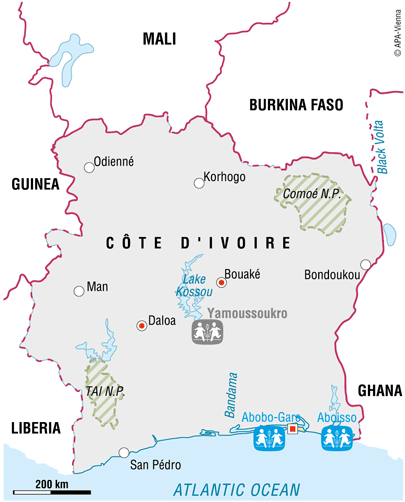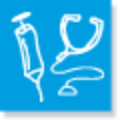
Côte d'Ivoire's was once one of the most prosperous in Africa, but is now marked by high levels of poverty, inequality and unemployment.
In 2010, post-electoral conflict led to violence and the displacement of thousands. In such harsh conditions, SOS Children's Villages has been supporting children and young people who are the most vulnerable members of society.
At present there are two SOS Children's Villages in Côte d'Ivoire, two SOS Youth Facilities, two SOS Kindergartens, two SOS Hermann Gmeiner Schools, three SOS Social Centres, one SOS Emergency Relief Programme and one SOS Medical Centre.
(You will receive a Canadian charitable tax receipt)
Please help us ensure a loving home for every child in Côte d'Ivoire. Sponsor a child in Côte d'Ivoire now.
For just $36/month you can sponsor a child and help provide an orphaned or abandoned child with:
- A safe and nurturing home
- A loving SOS mother
- Quality education
- Healthcare
- Nutritious food
- Clothing and toys
- All the things necessary for a bright future
SOS Children's Villages in Côte d'Ivoire
In 1962, a French priest founded "The Village of Friendship" just outside of Abidjan. In the 1970s, he discussed the idea of joining SOS Children's Villages with Hermann Gmeiner. In 1971, "The Village of Friendship" became the first SOS Children's Village on African soil.
As the number of orphaned and abandoned children in Côte d'Ivoire was rising steadily, we began working in the Aboisso region in the 1980s. Owing to the HIV/AIDS pandemic, SOS Children's Villages initiated an SOS Family Strengthening Programme in 2004, aiming to protect children who are at risk of losing the care of their family.
At present, SOS Children's Villages is helping Ivoirian children in three different locations by providing day care, education and medical assistance. Children whose families cannot take care of them can find a loving home in one of the SOS families.

Situation of Child in Côte d'Ivoire
The unstable political situation deeply affects the population The Republic of Côte d'Ivoire gained independence from France in 1960. French remains the country's official language and French influence is still widely noticeable.
During the 1960s and 1970s, Côte d'Ivoire was one of Africa's most prosperous nations due to foreign investment and cocoa exports, and was hailed as an African model of political stability and peace.Immigration from neighbouring countries rose steadily as it became known that farmers received high prices for their crops. The economic boom came to a halt in the 1980s, owing to an economic crisis of unprecedented magnitude that heavily affected the country.
In 2002, an armed uprising launched attacks in different cities of the country. The event marked the beginning of a period of instability that caused a social and humanitarian crisis. More than 200,000 people were driven out of the shantytowns of Abidjan and their homes destroyed with bulldozers.
In November 2010, Alassane Ouattara was declared the winner of the presidential election, but former President Laurent Gbagbo refused to accept defeat. Post-electoral violence erupted and led to the displacement of hundreds of thousands. Hundreds of thousands displaced as a result of post-electoral conflict While Côte d'Ivoire used to be a prosperous nation not too long ago, over 50 per cent of Ivoirians now face a life in poverty.
Over the last decades, the country has become one of the poorest in the world. Life expectancy is low at only 58 years and 14 per cent of the country's population are chronically undernourished. Nearly half the population in Côte d'Ivoire is illiterate. many regions, social services are inadequate and thousands lack access to decent housing, sanitation and medical assistance.
Food shortages are widespread. The number of poor has been on the rise partly as a result of the volatility of world prices for coffee and cocoa. HIV/AIDS remains one of the country's major public health challenges as around 3.4 per cent of Ivoirians are HIV-positive.
The civil war has displaced nearly one million people. Since Ouattara was sworn in in April 2011, this number has decreased but an estimated 300,000 people remain displaced. Both the new government and supporters of ex-president Laurent Gbagbo have been accused of human rights violations, and the situation continues to be very tense.
Children are in urgent need of protection
Demographically speaking, Côte d'Ivoire is a young nation: around 40 per cent of the population are less than 14 years old. On average, Ivoirian women give birth to 3.9 children - nearly 20 per cent of them are born underweight. Côte d'Ivoire is also marked by a very high infant mortality rate of 64.7 per 1,000 children.
Many Ivorian children face tremendous socioeconomic hardship. The vast majority of the 1.1 million orphans grow up without any support, struggling to survive as street children in the country's urban centres, begging for food and money. They are extremely vulnerable to commercial sexual exploitation, child labour and recruitment by armed gangs. These children are also frequently forced into labour, particularly in cocoa plantations.
When post-electoral violence reached its peak, hundreds of thousands of children could not attend school. Some schools were used by the armed forces and thus remained closed. Although a number of non-governmental organisations had been trying to get the students back to class as soon as possible, many schools could not be re-opened as quickly as they had hoped. However, since May 2011, roughly 85 per cent of children in the country's North and West have returned to the classroom.
Children, in particular young boys, continue to be used by pro-government militias and other armed forces. Although the government has increased efforts to stop the use of child soldiers, a number of reports have shown that children continue to be associated with both the militias and oppositional forces.
Sexual abuse of girls by people affiliated to the armed groups and the United Nations peacekeeping mission has reportedly occurred. However, the soldiers accused of sexual abuse have not been prosecuted.
Our Impact
Image
The SOS Children's Village in CÙte d'Ivoire provides loving homes to orphaned and abandoned children |
3 VILLAGES | 169 Orphaned and Abandoned Children |
Image
The SOS Youth Facilities in CÙte d'Ivoire provides youth with a loving environment where they learn to transition into independent living and to expand their education |
2 YOUTH FACILITIES | 165 Youths in our Care |
Image

The SOS Kindergarten in CÙte d'Ivoire are a fundamental building block for the early development needs including, intellectual and social skills for children. |
3 KINDERGARTENS | 171 Kindergarten students |
Image

SOS Social Centres in CÙte d'Ivoire aim is to help families, in particular women and children, living in communities neighbouring the SOS Children's Villages to gradually escape from poverty, and to help young people become self-reliant. |
3 SOCIAL CENTRES | 713 Beneficiaries |
Image

SOS Medical Centres in CÙte d'Ivoire provide quality health care to the children in our care, our staff, our staffís family as well as people in the surrounding community. |
2 MEDICAL CENTRES | 824 Patients |
Our Impact




